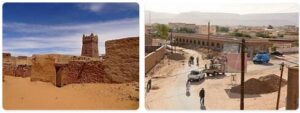Located in Northwest Africa, Mauritania is a vast and sparsely populated country characterized by a diverse landscape that includes the Sahara Desert, the Senegal River Valley, and the Atlantic coastline. With a population of around 4. 6 million, Nouakchott serves as both the capital and the largest city. Mauritania has a rich cultural heritage influenced by Arab-Berber traditions, with Arabic as the official language and an Islamic society that plays a central role in daily life. The nation gained independence from France in 1960 and has since navigated political stability challenges, including military coups. Governed as an Islamic Republic, Mauritania faces socio-economic challenges, such as high rates of poverty, slavery-related issues, and a reliance on agriculture and fishing. In terms of foreign policy, Mauritania has historically maintained a non-aligned stance, prioritizing diplomatic relations with a range of countries and actively participating in regional organizations, including the Arab League and the African Union (AU). The nation has a strong focus on fostering stability and security in the Sahel region, collaborating with neighboring countries on issues such as counterterrorism and border control. Mauritania has been an active participant in peacekeeping efforts, contributing troops to United Nations missions in conflict zones. The country’s foreign policy also reflects a commitment to addressing challenges related to migration, human trafficking, and transnational crime, particularly given its geographic location as a bridge between North and Sub-Saharan Africa. Economically, Mauritania faces the dual challenges of a reliance on traditional sectors, such as agriculture and fisheries, and the need for economic diversification. The government has initiated efforts to develop the mining sector, particularly iron ore extraction, as a key driver of economic growth. However, issues related to governance, infrastructure development, and social inequality persist. The nation’s vast desert landscape has also contributed to environmental challenges, including desertification and water scarcity. Mauritania’s domestic politics has witnessed periods of instability, with a series of coups shaping the country’s political landscape. The government has undertaken efforts to strengthen democratic institutions, but challenges related to political freedoms and human rights persist. The nation is characterized by a multi-ethnic society, and social cohesion remains a priority in addressing historical issues related to slavery and discrimination. In conclusion, Mauritania, with its strategic location at the crossroads of North and Sub-Saharan Africa, faces a complex set of challenges. Its foreign policy reflects a commitment to regional stability, security, and collaboration, while efforts to address economic diversification, social inequality, and governance issues remain ongoing. As the nation seeks to navigate its future trajectory, Mauritania’s engagement on both regional and international fronts will likely play a crucial role in shaping its development and stability. PROZIPCODES: Features defense and foreign policy of Mauritania.
Mauritania Travel Information

The Islamic Republic of Mauritania is a developing country located in a conflict-filled region. There is a general threat of terrorism in Mauritania due to porous borders against neighbors in the Sahel area. Attacks are often random and can hit…
Read more